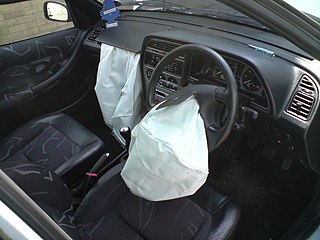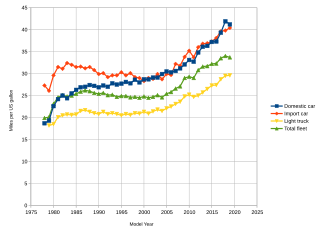
The General Motors Company (GM) is an American multinational automotive manufacturing company headquartered in Detroit, Michigan, United States. The company is most known for owning and manufacturing its four core automobile brands of Chevrolet, GMC, Cadillac and Buick. By sales, it was the largest automaker in the United States in 2022, and was the largest in the world for 77 years before losing the top spot to Toyota in 2008.

An airbag is a vehicle occupant-restraint system using a bag designed to inflate extremely quickly, then quickly deflate during a collision. It consists of the airbag cushion, a flexible fabric bag, an inflation module, and an impact sensor. The purpose of the airbag is to provide a vehicle occupant with soft cushioning and restraint during a collision. It can reduce injuries between the flailing occupant and the interior of the vehicle.

The Ford Pinto is a subcompact car that was manufactured and marketed by Ford Motor Company in North America from 1971 until 1980. The Pinto was the first subcompact vehicle produced by Ford in North America.

Unsafe at Any Speed: The Designed-In Dangers of the American Automobile is a non-fiction book by consumer advocate Ralph Nader, first published in 1965. Its central theme is that car manufacturers resisted the introduction of safety features, and that they were generally reluctant to spend money on improving safety. The work contains substantial references and material from industry insiders. It was a best seller in non-fiction in 1966.

Corporate average fuel economy (CAFE) standards are regulations in the United States, first enacted by the United States Congress in 1975, after the 1973–74 Arab Oil Embargo, to improve the average fuel economy of cars and light trucks produced for sale in the United States. More recently, efficiency standards were developed and implemented for heavy-duty pickup trucks and commercial medium-duty and heavy-duty vehicles.

Firestone Tire and Rubber Company is an American tire company founded by Harvey S. Firestone (1868–1938) in 1900 initially to supply solid rubber side-wire tires for fire apparatus, and later, pneumatic tires for wagons, buggies, and other forms of wheeled transportation common in the era. Firestone soon saw the huge potential for marketing tires for automobiles, and the company was a pioneer in the mass production of tires. Harvey S. Firestone had a personal friendship with Henry Ford, and used this to become the original equipment supplier of Ford Motor Company automobiles, and was also active in the replacement market.
The National Highway Traffic Safety Administration is an agency of the U.S. federal government, part of the Department of Transportation, focused on transportation safety in the United States.

The Jeep Grand Cherokee is a range of mid-size SUVs produced by the American manufacturer Jeep. At its introduction, while most SUVs were still manufactured with body-on-frame construction, the Grand Cherokee has used a unibody chassis from the start.
Joan Buckler Claybrook is an American lawyer and lobbyist who was president of Public Citizen from 1982 to 2009. She also served in the Carter administration as head of the National Highway Traffic Safety Administration (NHTSA) from 1977 to 1981.
The Firestone and Ford tire controversy of the 1990s saw hundreds of people die in automobile crashes caused by the failure of Firestone tires installed on light trucks made by Ford Motor Company.
Lemon laws are laws that provide a remedy for purchasers of cars and other consumer goods in order to compensate for products that repeatedly fail to meet standards of quality and performance. Although many types of products can be defective, the term "lemon" is mostly used to describe defective motor vehicles, such as cars, trucks, and motorcycles. Lemon laws originated to protect car buyers since vehicles that constantly have issues create risks and huge headaches.

The Ford Fusion is a mid-size car that was manufactured and marketed by the Ford Motor Company. From the 2006 through 2020 model years, two generations of the Fusion have been produced in gasoline, gas/electric hybrid, and gas/plug-in electric hybrid variants. The Fusion was manufactured at Ford's Hermosillo Stamping and Assembly plant in Sonora, Mexico, alongside the Lincoln MKZ, and formerly the Mercury Milan, both of which share its CD3 platform.
The 2008–2010 automotive industry crisis formed part of the 2007–2008 financial crisis and the resulting Great Recession. The crisis affected European and Asian automobile manufacturers, but it was primarily felt in the American automobile manufacturing industry. The downturn also affected Canada by virtue of the Automotive Products Trade Agreement.
When a person makes a claim for personal injury damages that have resulted from the presence of a defective automobile or component of an automobile, that person asserts a product liability claim. That claim may be against the automobile's manufacturer, the manufacturer of a component part or system, or both, as well as potentially being raised against companies that distributed, sold or installed the part or system that is alleged to be defective.
Sudden unintended acceleration (SUA) is the unintended, unexpected, uncontrolled acceleration of a vehicle, often accompanied by an apparent loss of braking effectiveness. Such problems may be caused by driver error, mechanical or electrical problems, or some combination of these factors. The US National Highway Traffic Safety Administration estimates 16,000 accidents per year in the United States occur when drivers intend to apply the brake but mistakenly apply the accelerator.

Takata Corporation was a Japanese automotive parts company. The company had production facilities on four continents, with its European headquarters located in Germany. In 2013, a series of deaths and injuries associated with defective Takata airbag inflators made in their Mexico plant led Takata to initially recall 3.6 million cars equipped with such airbags. Further fatalities caused by the airbags have led the National Highway Traffic Safety Administration (NHTSA) to order an ongoing, US-wide recall of more than 42 million cars, the largest automotive recall in U.S. history. In June 2017, Takata filed for bankruptcy. It was acquired by Key Safety Systems.

The Alliance for Automotive Innovation (AAI) is a Washington, D.C.-based trade association and lobby group whose members include international car and light duty truck manufacturers that build and sell products in the United States.

The General Motors ignition switch recalls refers to February 6, 2014 when General Motors recalled about 800,000 of its small cars due to faulty ignition switches, which could shut off the engine while the vehicle was in motion and thereby prevent the airbags from inflating. The company continued to recall more of its cars over the next several months, resulting in nearly 30 million cars recalled worldwide and paid compensation for 124 deaths. The fault had been known to GM for at least a decade prior to the recall being declared. As part of a Deferred Prosecution Agreement, GM agreed to forfeit $900 million to the United States.
Clarence Mintzer Ditlow III was an American consumer advocate, primarily focusing on automotive safety. He was closely associated with Ralph Nader's organizations, and has been given credit for helping to instigate several critical safety changes within the auto industry.
Small—On Safety: The Designed-In Dangers of the Volkswagen is a nonfiction book written by the Center for Auto Safety, with an introduction by Ralph Nader. The book looks at the deficiencies in the safety aspects of the vehicles sold by Volkswagen. It was published on September 11, 1972 by Grossman Publishers. The book is based on a study released in September 1971 by the Center entitled The Volkswagen: An Assessment of Distinctive Hazards. The book concluded that "the Volkswagen Beetle is the most hazardous car currently in use in significant numbers in the United States" and that "the VW microbus or van is so unsafe that it should be removed from the roads entirely."













